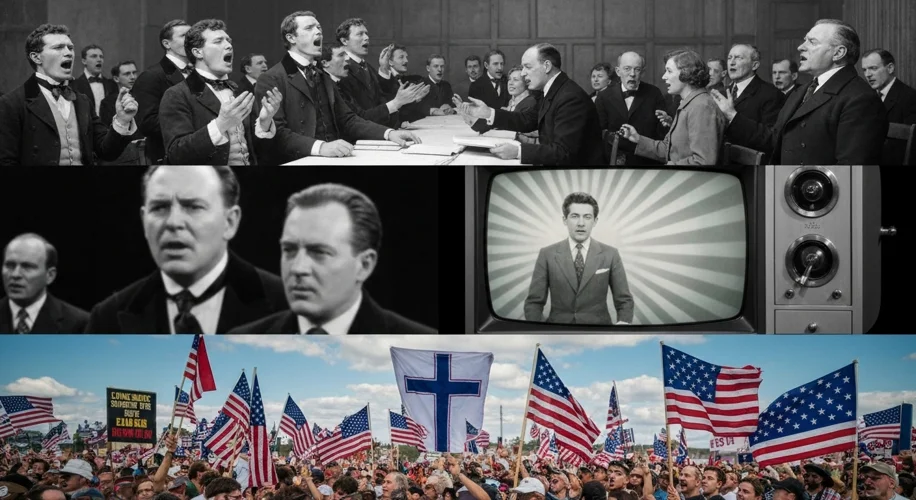The landscape of modern politics, particularly in the West, has been profoundly shaped by the persistent and often powerful currents of Christian conservative thought. While their influence may seem a recent phenomenon to some, the roots of this movement stretch back through centuries, intertwining with the very fabric of Western civilization and evolving with remarkable adaptability.
To understand this rise, we must rewind the clock to a time when faith was not merely a private conviction but a public, pervasive force. In early America, for instance, religious belief was deeply embedded in the public square. The “Great Awakenings,” waves of religious revivalism in the 18th and 19th centuries, fostered a sense of shared moral purpose that often translated into social reform movements, such as abolitionism and temperance. These were not explicitly “Christian conservative” in the modern sense, but they laid the groundwork for the idea that faith should inform public life and societal behavior.
The mid-20th century, however, marked a significant turning point. Following World War II, a growing unease settled in some segments of American society. Rapid social changes, the perceived moral decline associated with the burgeoning secularism, and the looming specter of the Cold War fueled a desire to return to what were seen as more traditional, religiously-grounded values. This era saw the emergence of key figures and organizations that would lay the foundation for the modern Christian conservative movement.
One pivotal moment was the response to the Supreme Court’s 1962 decision in Engel v. Vitale, which prohibited state-sponsored prayer in public schools. For many, this was not just a legal ruling but an assault on the nation’s religious heritage. Figures like Billy Graham, a renowned evangelist, played a crucial role in mobilizing evangelical Protestants, urging them to engage politically to defend their values. Simultaneously, Catholic social teaching, with its emphasis on traditional family structures and moral order, also contributed to a growing conservative Christian political consciousness.

The 1970s and 1980s witnessed the consolidation of this influence. The establishment of organizations like the Moral Majority, founded by Jerry Falwell Sr. in 1979, signaled a more organized and assertive approach. Falwell, a Baptist minister, masterfully blended religious rhetoric with conservative political ideology, rallying millions around issues such as abortion, prayer in schools, and opposition to communism. This period saw Christian conservatives become a formidable voting bloc, significantly impacting elections and policy debates. Their engagement was not limited to domestic issues; the perceived threat of atheistic communism also spurred a sense of global mission, aligning with Cold War foreign policy objectives.
The movement’s strategies evolved. Beyond mass mobilization, they developed sophisticated lobbying efforts, media outreach, and the establishment of think tanks and educational institutions. Think of Pat Robertson, a television evangelist and founder of the Christian Broadcasting Network (CBN) and the Christian Coalition, who used his media empire to shape public opinion and mobilize voters. The focus broadened to encompass a wide range of social issues, often framed through a lens of biblical interpretation.
Key actors emerged with distinct perspectives. Within the broader Christian conservative umbrella, there were nuances. While many evangelicals prioritized issues like abortion and religious freedom, some Catholics might have focused more on economic justice and peace, though often within a broadly conservative framework. The alliance, however, proved potent, creating a unified front on many cultural and social battlegrounds.
The impact has been undeniable. Christian conservative movements have played a significant role in shaping legislation on issues ranging from abortion access to LGBTQ+ rights. Their influence has extended to judicial appointments, with a strong emphasis on appointing judges who adhere to originalist interpretations of the Constitution. Furthermore, their engagement in international activism has grown, advocating for religious freedom abroad and often aligning with specific foreign policy agendas that they believe promote Christian values.
Analyzing this phenomenon requires acknowledging its deep historical roots and its capacity for adaptation. It is a testament to the enduring power of deeply held beliefs to shape political action. The movement represents a complex interplay of religious conviction, cultural anxieties, and political strategy. As society continues to evolve, the influence and strategies of Christian conservative movements will undoubtedly continue to be a significant force in the ongoing dialogue about faith, values, and public life.
Today, the landscape is ever-shifting. While the core tenets often remain, the methods and focus continue to adapt to new social and technological environments. The rise of Christian conservative political movements is not a monolithic story, but a dynamic narrative of faith, politics, and the persistent human desire to shape the world according to deeply held convictions.

